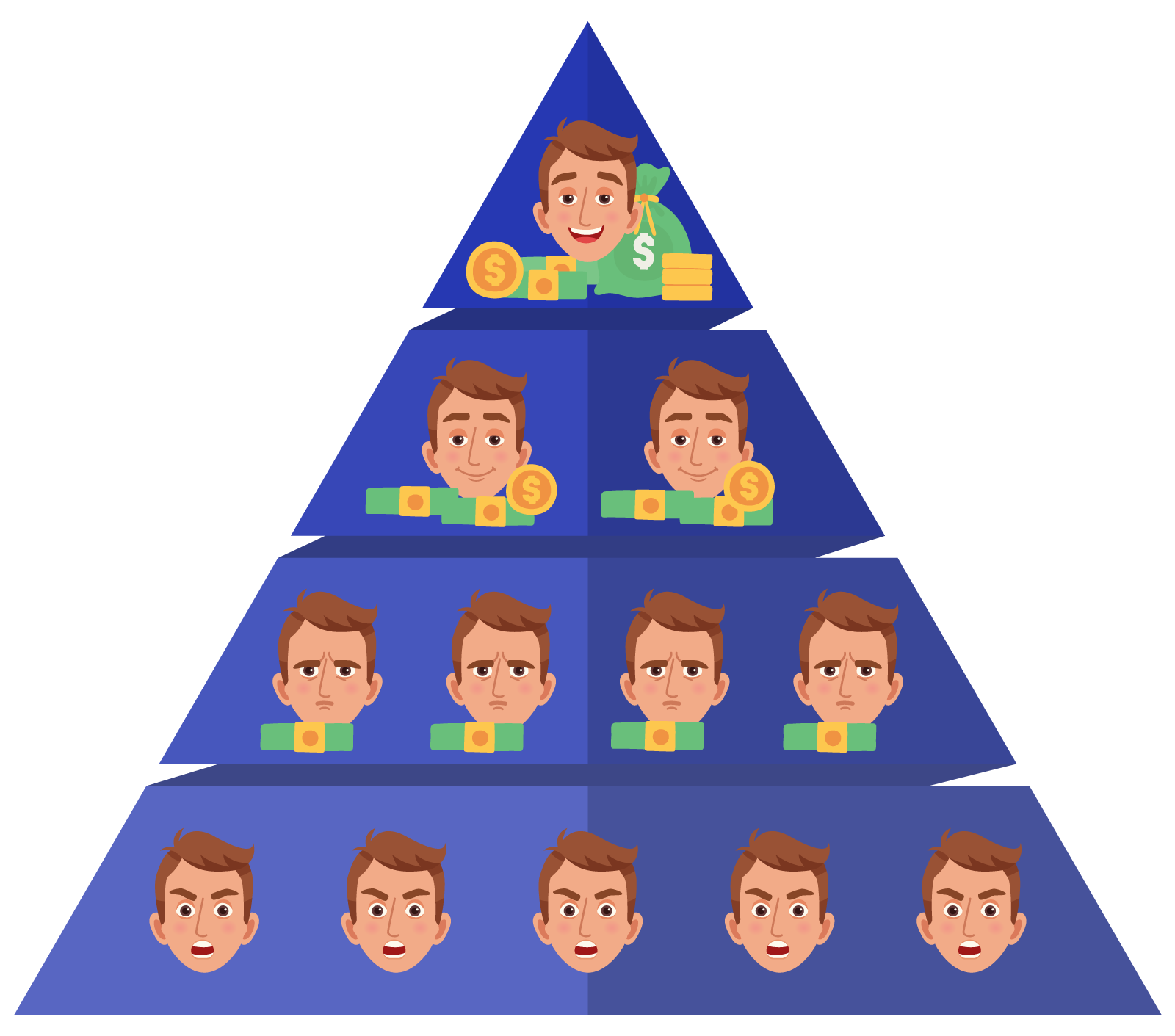Affiliate marketing and pyramid schemes are often talked about as two sides of the same coin.
But that couldn’t be further from the truth.
When you break it down, the answer to “Is affiliate marketing a pyramid scheme?” is pretty clear-cut: affiliate marketing is not a pyramid scheme.
In this article, you’ll learn how to tell the difference between legitimate affiliate marketing programs and illegal pyramid schemes. I’ll also share how to identify and avoid pyramid schemes so you don’t accidentally get caught up in one.
Affiliate Marketing: What Is It and How Does It Work
Affiliate marketing is a performance-based marketing arrangement. The affiliate marketer promotes a product or service and earns commissions on any resulting sales.
Here’s a brief walkthrough of the process:
- Sign up for an affiliate program.
- Get an affiliate link for the different products or services in the program.
- Create content to promote the affiliate link to your audience.
- Interested users visit the product page using your link.
- If they buy the product, the system recognizes that the sale came from your link, and you earn a commission.

Benefits of Affiliate Marketing
Affiliate marketing mutually benefits both businesses and affiliate marketers.
Here’s how businesses benefit from having an affiliate marketing program:
- Profit-guaranteed marketing: Businesses only pay commission when a product is sold.
- Extended reach: Every affiliate is a potential source of new business.
And how do affiliates benefit?
- Low barrier to entry: It costs virtually nothing to start an online business in affiliate marketing. All you really need is a computer to build an affiliate marketing website.
- Extremely scalable: Join multiple affiliate programs and build a diverse revenue stream.
- Build a passive income: With time and the right strategies, affiliate marketing can replace your income. In fact, our affiliate marketing statistics page shows that the average affiliate marketer makes over $8,000 per month
Pyramid Schemes: What Are They and How Do They Work
A pyramid scheme is a type of fraudulent investment strategy where the profits are based primarily on recruiting new members, rather than legitimate business activities or product sales.
Here’s how it works:
- Initial recruitment: The person at the top recruits others to join the scheme and invest money.
- New members pay to join: These new members then recruit others to join, and their recruits pay fees or “investments” to the higher-ups in the pyramid.
- Redistribution of funds: The money paid by the new members funnels up the pyramid to the higher-ranking members.
- Continued expansion required: For everyone to make money, there must always be new recruits. Once recruitment slows down, the pyramid collapses, and nearly everyone loses their investment. Only those at the top may turn a profit.

Here are some notorious pyramid schemes:
- United Sciences of America (USA) pyramid scheme had $8.6 million in debt before shutting down in 1987.
- WakeUpNow pyramid scheme failed to provide profit to 95% of its distributors and ceased operations in 2015.
- Vemma pyramid scheme faced $238 million fines before shutting down in 2015.
And here are some defining characteristics of a pyramid scheme:
- Promises you’ll earn easy money.
- Demands a hefty signup fee.
- Lacks a genuine product or service that provides value.
- You’ll primarily earn money by recruiting other members.
Apart from the obvious risk of losing your investments, joining a pyramid scheme can also damage relationships as you coax people to join with you. Worst-case scenarios even include potential legal actions from angry recruits.
Is Affiliate Marketing a Pyramid Scheme
Affiliate marketing is not a pyramid scheme. It’s a legitimate business model where you join a free program and earn commissions by promoting products or services with actual value.
In contrast, pyramid schemes charge a signup fee, and earning money requires recruiting more members.
Affiliate marketers provide a valuable service in creating useful resources and identifying high-quality products to buy. Without this industry, many of your favorite websites, social media accounts, and YouTube channels likely wouldn’t exist.
In fact, its status as a legitimate business model is what makes affiliate marketing a great way to make money online. The affiliate marketing earnings potential exists because you’re building an honest and useful business – it’s not based on a rickety pyramid structure that could come crashing down at any moment.
However, the affiliate marketing world isn’t free of malicious actors. There are affiliate marketing scams to watch out for, and you’ll need to discern the good programs from the bad to stay safe. That’s what we’ll be looking at in the next section.
How to Tell the Differences Between Affiliate Marketing and Pyramid Schemes?
Here’s a simple table to capture how affiliate marketing differs from pyramid schemes.
| Points of Comparison | Affiliate Marketing | Pyramid Scheme |
|---|---|---|
| Area of focus | Promoting products or services to potential customers. | Recruiting new members. |
| Signup fees | None. Legitimate affiliate networks don’t charge signup fees. | Yes, often high. |
| Legitimate products or services | Yes. Products or services provide genuine value to customers. | Rarely. If present, products are overpriced and serve as a facade. |
| Sustainability | Sustainable and scalable by promoting products with genuine market demand. | Unsustainable. Collapses as recruitment opportunities diminish. |
| Transparent terms and conditions | Clear-cut terms of service | Usually vague to disguise the pyramid nature. |
Successful pyramid schemes cleverly hide their pyramid structure, and they can be hard to identify at first glance. Here are some practical pointers to help you differentiate between affiliate marketing programs and pyramid schemes:
- Read the Terms & Conditions: These should be on the official website, clarifying compensation and other essential aspects.
- Watch out for big promises: Most affiliate programs highlight commissions per sale, not mythical earning potential. How much you earn depends on the effort you put in.
- Program age and backing: New programs from unknown companies deserve a closer look.
- Reviews: Feedback from reviews, forum discussions, and testimonials offer invaluable insights. Search Google for “affiliate program name scam” and see what turns up.
- Assess the product: Watch product reviews from trusted sources to see if the product provides real value.
Conclusion
If anyone asks you, “Is affiliate marketing a pyramid scheme?” you can now confidently tell them it isn’t – and explain why.
That’s a question you may get if you want to start affiliate marketing…
…and if you want to give it a shot, you’re in the right place.
We’ve been building successful affiliate marketing websites for over 10 years, and we’ve used our courses to help 15,001 people create their own legitimate businesses.
To learn more about what’s involved and begin your own affiliate marketing journey, read through our comprehensive beginner’s guide now:






